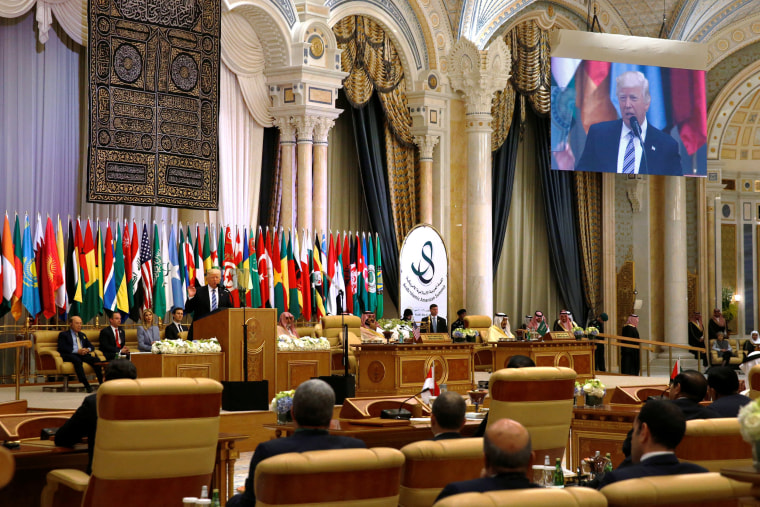President Donald Trump tempered his rhetoric on the Muslim world in a speech given in Saudi Arabia on Sunday, earning praise from some corners and condemnation from others.
His remarks in Riyadh tamped down the incendiary tenor Trump maintained during the 2016 campaign, which were pleasing to his base, but inflamed the opposition.
The relatively even keel stayed on target as the president read carefully from his teleprompter and avoided off-the-cuff remarks that got him into trouble in the past.
"This is not a battle between different faiths, different sects, or different civilizations," Trump said. "This is a battle between barbaric criminals who seek to obliterate human life, and decent people of all religions who seek to protect it,” Trump said. "This is a battle between good and evil."
Many saw this speech to be quite moderate compared to what candidate Trump was known for.
But some Iraqis who watched the speech in Baghdad weren't quite buying the president's latest line.
"He is trying now to change his real face by wearing a mask of the moderate president who takes care of Islam and Muslims," said Abdullah Jaffat, a 22-year-old college student. "Therefore, what has been said in the summit are just words."
"We have to wait until we see how he is going to deal with the problems of Arab and Islamic countries," said 47-year-old Iraq Ministry of Construction employee Laith Abdulhussein Hadi. "I hope he is going to succeed in this task. I hope he is going to support important steps that brings stability into Islamic countries."
Others said they shared that hope because they have no other option.
"He mentioned before that he is going to deal in a tough way with terrorists and extremists," said Hassan AbdulKerim Shehalb, a 56-year-old engineer. "I hope he is going to succeed in his goal to eliminate terrorism in Iraq and the region. We have no other option now; we have to join Trump’s coalition."
Meanwhile, some residents of Kabul, Afghanistan, were big fans of the speech.
"At the beginning to become famous, he talked so negative against Islam," said Saed Abbas, a 31-year-old tailor. "He banned seven Muslim countries to travel to the U.S. Now you can see that his first foreign trip is to Saudi Arabia, as you know there is big conflicts in Middle East. Now he is standing with his closest allies."
Shukur Hashimi, a 26-year-old journalism student in, agreed.
"It was for the benefit of region, and for the world," Hashimi said. "He mentioned very good points, which during his election campaign he didn’t mentioned about these things. His strategies and ideas totally changed."
In Jerusalem, some considered the speech an indication that Trump was playing politics and not keeping his word. To them, it was business as usual from the United States.
"Not just Trump, but all presidents had tough standpoints towards the Arab world," said Omar Shalaby, a 46-year-old who owns a photo shop. "But they change after they become presidents because they seek U.S. interests."We saw this in Trump's attitude towards the Muslim world and in moving the embassy to Jerusalem — he has delayed that move after he became president."
American Muslims, meanwhile, were less than laudatory. While they appreciated Trump toning down his anti-Muslim rhetoric, they said they were skeptical his actions would live up to his words.
"We welcome President Trump’s recognition of Islam as 'one of the world’s great faiths,' but that recognition does not wipe out years of well-documented anti-Islam animus," said Council on American-Islamic Relations National Executive Director Nihad Awad in a statement. "The president should also recognize the contributions American Muslims make — and have made for generations — to the betterment of our nation."
Though the speech seemed to steer away from the harsh criticisms the president had leveled at the Muslim world, it did not seem to bother his base.
Still, some members of the global far-right movement did not care for the softened tone.
Initially noteworthy was Trump steering clear of his much-discussed "radical Islamic terrorism" label, which was pushed by Chief White House Strategist and former Breitbart Chairman Steven Bannon. Instead, he stuck to the foreign policy community's preferred "Islamic extremism."
But then the president let an "Islamic terror" slip, quickly earning criticism.
Trump also said that the United States should not be responsible for driving out terrorists and extremists from the Middle East, instead insisting that the nations of region would have to decide their future for themselves.
"A better future is only possible if your nations drive out the terrorists and drive out the extremists," the president said. "Drive them out. Drive them out of your places of worship. drive them out of our community. drive them out of your Holy Land and drive them out of this Earth."
Before Trump spoke, King Abdullah kicked the event off with a few remarks of his own. Knowing the new administration’s tendency to blame the Muslim religion for terrorism and extremism, Abdullah pointed the finger at Iran.
"The Iranian regime has been the spearhead of global terrorism since the Khomeni revolution in 1979," he said.
Trump also offered a sharp rebuke of Iran, which just underwent a major election. The Islamic Republic elected the more progressive candidate, Hassan Rouhani, to his second term.
Iran's Foreign Minister quickly responded on Twitter.
Trump didn’t take the opportunity to address the many human rights abuses found in the Middle East, something that former President Barack Obama spoke to during his first visit to the region eight years ago. Instead, he said he only sought security for the region.
"We are not here to lecture — we are not here to tell other people how to live, what to do, who to be, or how to worship," Trump said. "Instead, we are here to offer partnership — based on shared interests and values — to pursue a better future for us all."

